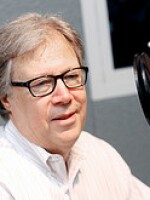There’s something astonishing about the ability to create music that, half a century later, can cause thousands to rise from their seats.
Just to get this out of the way, I have no problem calling Brian Wilson a genius.
Over the years, some of my classical music friends have clucked at my willingness to grant this designation to the man who brought us “Fun, Fun, Fun” and “Surfer Girl” and “Little Deuce Coupe.”
My reply is, OK, right -- the genius thing really doesn’t fit unless you add in “‘Til I Die,” “God Only Knows,” "Surf’s Up,” “Please Let Me Wonder,” “Sail on, Sailor,” “Heroes and Villains,” and dozens more of Brian’s later, more recondite pieces of work, the ones that tend to be far removed from his original universe of competition clutches and girls who get so tan.
And yet.
Having just seen Brian’s sold-out performance at Tanglewood, I have to say there’s something rare and astonishing about the ability to create music – any music -- that, half a century later, can cause thousands of adults (surely now including a proportional sprinkling of investment bankers, neurosurgeons, comparative literature scholars, etc.) to rise from their seats, singing and dancing, at the mere first few bars of song after song.
Poignantly, on this day, these adults are also clearly united in their wish to convey their deepest respects to the frail, damaged, brilliant figure up there behind the ebony grand piano – the man who has created this music and in the process has brought these people a specific kind of happiness that, from the look of it, is very possibly the equal of any happiness they have ever known.

In other words, as we contemplate the G word, let’s not entirely dismiss “Fun, Fun, Fun.”
I’m rambling a little bit here because, to be honest, I was unprepared for the impact of seeing this 73-year-old man -- afflicted by heaven knows what combination of drug abuse, childhood trauma, and fragile psychic wiring – shamble (assisted by an aide) onto the stage, not acknowledging the cheering throng in front of him, and rarely breaking that crooked, quizzical facial expression that he has worn for so many years now.
The result was a concert unlike any I have ever attended -- exhilarating, sobering, raucous, touching.
But when the music started -- and it issued from a tight, ten-member ensemble that included founding Beach Boy Al Jardine -- we all relaxed a little, pleased to realize that the show had been carefully designed to minimize Brian’s deficits and instead showcase the afternoon’s true headliner: his durable, smile-inducing, complex but unremittingly tuneful body of work.
The result was a concert unlike any I have ever attended -- exhilarating, sobering, raucous, touching.
A few specific observations:
- Vocally, Brian’s condition was better than I might have guessed. I mean, he’s a guy in his 70s and all of those years are certainly detectable in the effortful, occasionally raspy sound that he produces. But with the exception of Paul Simon, who seems like he will be blessed to retain his boyish folkie tenor forever, Brian must be counted as one of the more vocally intact of rock’s septuagenarians. True, he does not venture into falsetto (the once-celebrated Brian Wilson “whine”), but on this tour Al Jardine's son Matt is on hand to handle that territory, as well as any other last-minute vocal seam-mending that might be required.
- The advertised focal point of this concert was the celebration of the 50th anniversary of the Beach Boys’ “Pet Sounds” album. And indeed, every song from that seminal LP was faithfully rendered, and in order. But since the recording is only 37 minutes long, it meant that this segment constituted only about a third of the concert -- sandwiched between two extended greatest hits medleys. For me, the “Pet Sounds” high point -- if that’s even the right term -- was the often-overlooked “I Guess I Just Wasn’t Made for These Times.” Elvis Presley once called Hank Williams’ “I’m So Lonesome I Could Cry” the saddest song ever written. I beg to place “I Guess….” in nomination.
- I was impressed, even amazed, at the ability of this ensemble to replicate, live, the precise sound and feel of the original recordings. I mean, this is not always a huge challenge in the rock world, but in the Brian Wilson world -- which often partakes of lush, almost orchestral textures -- it’s a significant achievement. Specifically, we heard the rubber-bulb bicycle horn at the end of “You Still Believe in Me,” the low-register flute in “God Only Knows,” the jaunty Theremin on “Good Vibrations,” and even some very credible timpani sounds, furnished by what looked to be some high-tech electronic percussion pads. For the true musical geeks out there, I was also impressed that all the songs were offered in their original youthful keys, rather than, as is the practice of many pop graybeards, transposed down a few forgiving steps.
Brian’s finale was his tender “Love and Mercy,” slightly revised to include an oblique reference to the Orlando massacre.
It was a moving, fitting finale.
And it pointed to perhaps one additional argument in favor of the genius designation: the man's capacity to send us out into the late afternoon sunshine contemplating mortality and the precarious human condition on the one hand, while having simultaneously made us, for a couple of hours anyway, seriously freaking euphoric on the other.
Reach Steve Metcalf at spmetcalf55@gmail.com.


